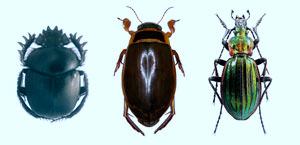Behold the Cyborg Spy Bugs of the Future
As if our current surveillance society wasn't creepy enough, the wave of the spying future may come on the backs of creepy-crawlies. No joke -- in tiny beetle "backpacks" or perhaps hitched around their wing muscles. Read it and get skeeved out.
As if our current surveillance society wasn’t creepy enough, the wave of the spying future may come on the backs of creepy-crawlies. No joke — in tiny “backpacks” or perhaps hitched around their wing muscles. Read it and get skeeved out. –KA
Your support matters…BBC:
The University of Michigan team of engineers published their study in the Journal of Micromechanics and Microengineering.
The report noted that, despite major advances in micro-air-vehicle technology, no-one had been able to match the aerodynamic performance and manoeuvring capability of insects.
However, it said that if insects were to be equipped with control mechanisms and other add-on kit, the equipment would require a power source.
The team rejected the idea of using miniature solar panels because they would be dependent on available light. So the group decided to develop a vibration energy collector.
The resulting device consists of a tiny three-layered spiral generator.
Independent journalism is under threat and overshadowed by heavily funded mainstream media.
You can help level the playing field. Become a member.
Your tax-deductible contribution keeps us digging beneath the headlines to give you thought-provoking, investigative reporting and analysis that unearths what's really happening- without compromise.
Give today to support our courageous, independent journalists.









You need to be a supporter to comment.
There are currently no responses to this article.
Be the first to respond.